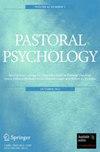Good for Coping, Not for Eudaimonia: The Effectiveness of a Spiritual/Religious Intervention in the Healthcare of Breast Cancer Patients
IF 0.7
Q3 PSYCHOLOGY, MULTIDISCIPLINARY
引用次数: 0
Abstract
This study examined the effectiveness of a spiritual/religious intervention on religious coping and eudaimonic psychological well-being in breast cancer survivors. A quasi-experimental design with pre- and post-tests and a control group was used to study 60 Iranian breast cancer patients. The 14-item Brief RCOPE and the Ryff’s 6-Dimensional Psychological Well-Being Scales were administered at baseline and follow-up. An analysis of covariance revealed that spiritual/religious intervention was effective in increasing positive religious coping and reducing negative religious coping but not in increasing psychological well-being. Implications of the findings for the healthcare of women with breast cancer are discussed.
利于应对,不利于幸福:精神/宗教干预在乳腺癌患者保健中的效果
本研究探讨了精神/宗教干预对乳腺癌幸存者的宗教应对和幸福心理的影响。该研究采用准实验设计,对 60 名伊朗乳腺癌患者进行了前后测试和对照组研究。在基线和随访期间,对 14 个项目的简要 RCOPE 和 Ryff's 6 维心理幸福感量表进行了测试。协方差分析表明,精神/宗教干预能有效增加积极的宗教应对和减少消极的宗教应对,但不能增加心理健康。本文讨论了研究结果对乳腺癌女性患者医疗保健的影响。
本文章由计算机程序翻译,如有差异,请以英文原文为准。
求助全文
约1分钟内获得全文
求助全文
来源期刊

Pastoral Psychology
Multiple-
CiteScore
1.40
自引率
25.00%
发文量
55
期刊介绍:
Pastoral Psychology, founded in 1950, is one of the most well-established and respected journals in the field of psychology and religion/spirituality. Pastoral Psychology is an international forum that publishes scholarly, peer-reviewed original articles that address varied aspects of religion and spirituality from physical, human science, and interfaith perspectives.
Historically, the word “pastoral” has referred to the care of individuals, families, and communities. Today, we additionally consider “pastoral” in terms of lived experience as it relates to embodiment, the social-political, economic, spiritual, and environmental dimensions of life.
All theoretical perspectives are welcome, as Pastoral Psychology regularly publishes articles from a variety of schools of thought, including, but not limited to, psychoanalytic and other dynamic psychologies, cognitive psychologies, experimental and empirical psychologies, humanistic psychology, transpersonal psychology, and cultural psychology. Insights from existential perspectives, intersectional theories, philosophical and theological theories, gender and queer studies, sociology, anthropology, public mental health, and cultural and empirical studies are welcome. Theoretical contributions that have direct or indirect relevance for practice, broadly construed, are especially desirable, as our intended audience includes not only academics and scholars in religion and science, but also religious and spiritual leaders, as well as caregivers, chaplains, social workers, counselors/therapists, clinical psychologists, psychiatrists, and persons interested in matters of religion/spirituality and psychology.
Pastoral Psychology welcomes scholarship and reflection from all religious and spiritual traditions. In addition to scholarly research papers, the journal welcomes thoughtful essays on a wide range of issues and various genres of writing, including book reviews and film reviews. The community of scholars represented in its pages has demonstrated that the life challenges the journal seeks to address are universally shared, yet also reflect individual social, cultural, and religious locations. The journal, therefore, welcomes submissions from scholars from around the world.
 求助内容:
求助内容: 应助结果提醒方式:
应助结果提醒方式:


